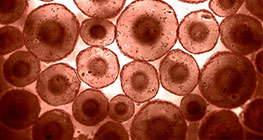

 Training in the broad areas of Cell Biology and Neuroscience leading to the Ph.D. degree is available to prepare students for research and teaching careers in universities, medical schools and private industry.
Training in the broad areas of Cell Biology and Neuroscience leading to the Ph.D. degree is available to prepare students for research and teaching careers in universities, medical schools and private industry.
Ongoing projects include studies of oncogene expression and cytokines, modulation of neuronal signaling, growth control in skeletal muscle, signal transduction in a variety of tissues including platelets, muscle cells, and the nervous system, intracellular protein degradation, cytoskeletal and receptor function, the development and regeneration of the visual system, extracellular matrices and limb development, spinal cord injury, neural stem cells and brain development, mechanisms of neural plasticity in memory and learning, mechanisms involved in epilepsy using both human tissues and animal models, and molecular mechanisms of Alzheimer’s disease. The department has state-of-the-art facilities for the techniques used in these studies, which include tissue culture, subcellular fractionation, fluorescent digital image analysis, electrophysiological recording, and confocal and 2-photon microscopy.
Students may enter the Ph.D. program in one of three ways: (1) via our Integrated Ph.D. Program (IPP), which does not require a declaration of a major until the second year of study, (2) with advanced standing following the completion of one of the Graduate School’s Master’s programs, or (3) highly motivated and talented students from NYMC’s School of Medicine may be admitted to the dual-degree M.D./Ph.D. program.
An average grade of “B” (GPA = 3.00 or better) must be maintained in the required courses. Students choose either Neuroscience (BMSM 5150) or Histology (CBAM 1320 + CBAM 1330) based on their research interests. Elective courses are also selected based upon the student’s interests, in consultation with the Graduate Program Director and research sponsor. To gain teaching experience, students must assist in teaching for one semester in one of the department’s medical school courses (CBAM 8320 or 8330). To become familiar with on-going research projects, students must attend “Work in Progress” seminars given by faculty, postdoctoral fellows and graduate students. Participation in weekly Journal Club (CBAM 8010) and Research Seminar (CBAM 8020) sessions is also required in all years of residence. Research Techniques (CBAM 9200) is taken each semester after completing all first-year research rotations (BMSM 9110 or CBAM 9110) until candidacy is achieved. Once candidacy is achieved, students enroll each semester for doctoral dissertation research (CBAM 9900). View the course descriptions here.
The course requirements for students entering through the Integrated Ph.D. program or with Advanced Standing are the same. Advanced Standing students will add to the courses taken as an NYMC Master's student to complete their Ph.D. degree requirements, but are not required to participate in research rotations.
The M.D./Ph.D. program overview can be found in the M.D./Ph.D. section of our website.
Program Director:
Victor A. Fried, Ph.D.
Basic Sciences Building - Room 236
victor_fried@nymc.edu
(914) 594-4005